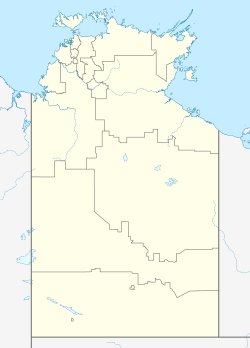This article needs additional citations for verification. (January 2020) |
Gorrie Airfield was a Royal Australian Air Force (RAAF) airfield in the Northern Territory of Australia during World War II located about 10 km (6.2 mi) north of Larrimah and about 67 km (42 mi) south of Mataranka in what is now the locality of Elsey.[1][2]
| Gorrie Airfield | |
|---|---|
| Elsey, Northern Territory, Australia | |
| Coordinates | 15°29′13.52″S 133°10′48.84″E / 15.4870889°S 133.1802333°E |
| Type | Military Airfield |
| Site history | |
| In use | 1943–1945 |
The airfield was named after Flying Officer Peter Gorrie who was killed in action on 12 January 1942 during an attack against enemy shipping at Menado.[2][3]
The establishment at Gorrie comprised over 6,000 RAAF personnel responsible for aircraft and vehicle maintenance for the RAAF and United States Army Air Forces. A large petrol storage and bomb dump were constructed as part of the airfield. The remains of the runway and many of the buildings and structures are still visible.
Part of the airfield covering an area of 10.46 hectares (25.8 acres) was listed on the Northern Territory Heritage Register on 28 July 2010 under the name, "WII Gorrie Airfield Precinct".[1][4]
Units based at Gorrie Airfield
edit- No. 9 Stores Depot (RAAF)
- No. 14 Aircraft Repair Depot (RAAF)
- No. 18 Replenishing Centre (RAAF)
- No. 55 Operational Base Unit (RAAF)
See also
editReferences
edit- ^ a b "WWII Gorrie Airfield Precinct". Heritage Register. Northern Territory Government. 28 July 2010. Retrieved 27 April 2019.
- ^ a b "WWII Gorrie Airfield, Larrimah: Background Historical Information". Department of Natural Resources, Environment, the Arts and Sport, Northern Territory Government. 2011. p. 1. Retrieved 14 January 2020.
- ^ "THE ODD COLUMN". Murray Pioneer. South Australia. 30 March 1944. p. 4. Retrieved 15 January 2020 – via Trove.
- ^ Hampton, Karl Rio. "NORTHERN TERRITORY OF AUSTRALIA, Heritage Conservation Act, DECLARATION OF HERITAGE PLACE, WII GORRIE AIRFIELD PRECINCT". Northern Territory Government. Retrieved 27 April 2019.[permanent dead link]
External links
edit
